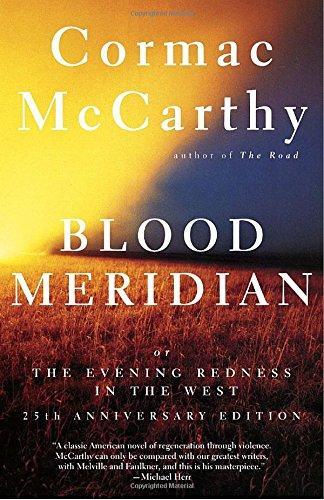Orlion reviewed Blood Meridian by Cormac McCarthy
Review of 'Blood Meridian' on 'Goodreads'
5 stars
It would be very difficult to talk about this novel without getting caught up in a maelstrom of differing critical interpretation. This is understandable, considering the choice in style Cormac McCarthy utilizes... but perhaps I'm getting ahead of myself.
Before writing westerns, McCarthy wrote what may be considered Southern Gothic or Faulknerish novels set in the depraved Appalachian country. Blood Meridian was his first, and many consider best, Western. This is particularly interesting since we start the novel with "the kid" who runs away from Tennessee and eventually makes his way to Texas and Glanton's band of scalp-hunters.
Another interesting tidbit: the historical Glanton was also from Tennessee. I mention all this to begin with because it seems as if the novel begins as a "moving away" from the earlier works of McCarthy. Cormac does not start out writing a Western, he transitions from the Southern literature of his early career into an apocalyptic Western.
Or perhaps inferno might be a better word than apocalyptic. The lethal landscape of the undeveloped West is very much a main component of Blood Meridian. The destitute deserts, some of which have transitory lakes, are home to the demonic denizens who exist to suffer and inflict suffering.
And there is plenty to go around. If you have heard anything about this book, it is that it is incredibly violent. And, to be frank, with a title like "Blood Meridian" one could not be blamed for it. It has been said that the violence ceases to be shocking and becomes somewhat a chore as the novel goes on. This is probably the point, and provides the very little insight into the mind of the characters that we get.
Which finally leads to the style choice I referred to at the beginning of this review: There is almost no description of what is going on in the character's head. There is one brief abstract of Glanton's life philosophy towards the end, and that is it. Aside from that, all we have are the actions of the characters and some dialogue, most of which is pretty sparse. There are no insights into the motivations of these characters. For all the reader knows, they could just be automatons acting out a predetermined path.
Not all the characters are stingy with their speech. At long last, I arrive at the Judge Holden character. In the company of men who scalp men, women and children for money, the Judge is considered cruel and depraved. When we first meet the Judge, he capriciously endangers lives. He ends up a part of Glanton's gang before "the kid" joins up, but we are told of how he enlisted himself into that group through... Tobin, I believe.
Essentially, the Judge showed up like a devilish djinn when Glanton's gang was in danger of being slaughtered by a group of Apaches. Through the Judge's aid, they are able to repel the attack and survive, but it seems as if a deal with a devil has been struck. And of course, the consequences of the devil collecting are far greater than the benefits of his aid.
And I could try and go deeper, but this is a review... and like I said, I would like to avoid the maelstrom that would suck me in if I try to interpret too much. So, my verdict based on reading only two other Cormac McCarthy novels are as follows. It is much more apocalyptic than The Road, more violent and nihilistic than No Country Than Old Man and probably rates as Cormac McCarthy's most interesting and inscrutable work.

